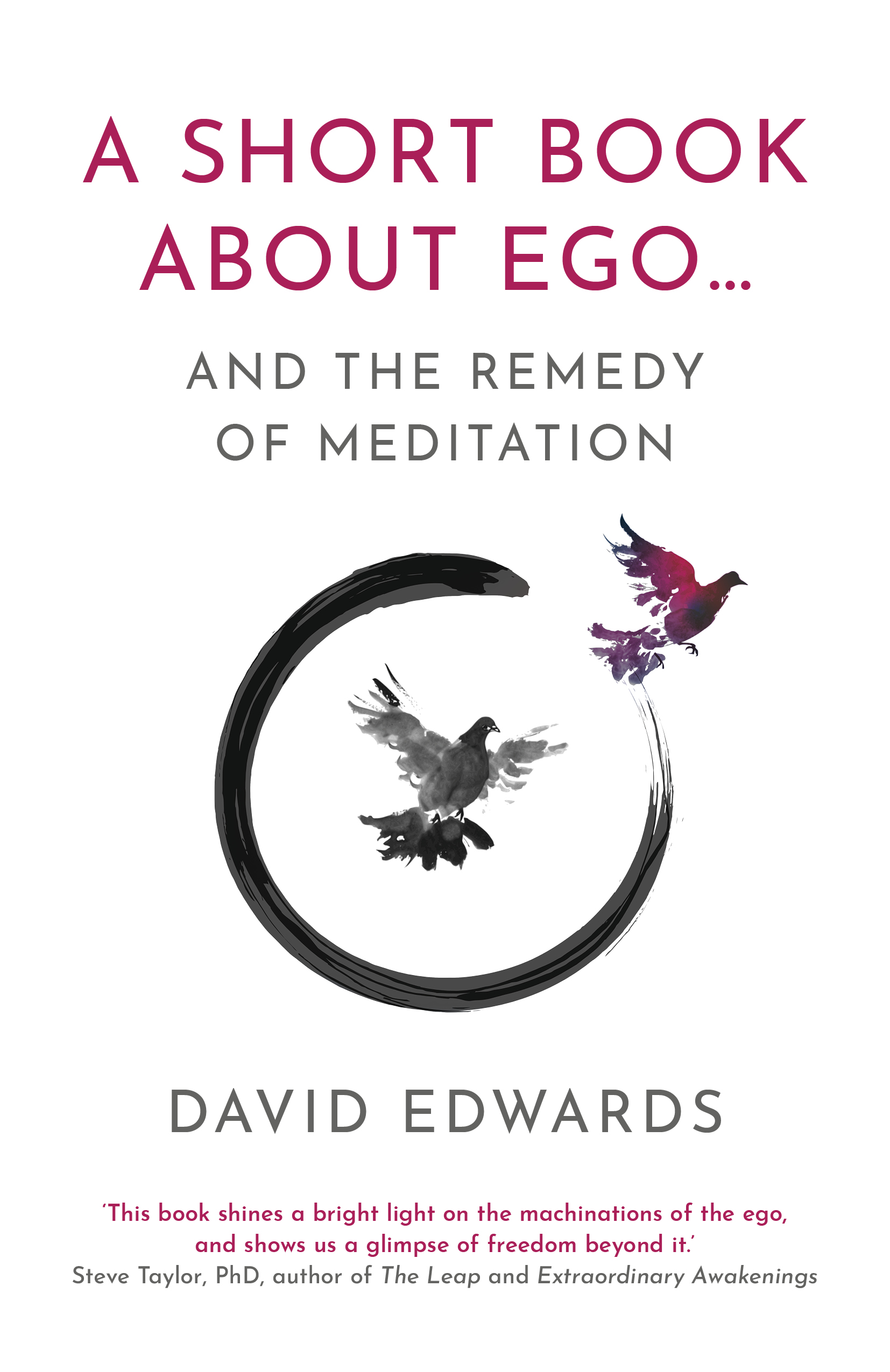- Home
- Editor's Notes
- Current Issue
- Riki Reflects
- Spiritual Traveler
- Starz Emporium
- Classifieds
- Advertise with Us
- Submissions
- Awards
- About Us
- Contact Us
A Short Book About Ego... and the Remedy of Meditation
By David Edwards
 A Short Book About Ego... and the Remedy of Meditation By David Edwards Published by Mantra Books, July 1st, 2025 The human mind stands at the centre of a circle of mirrors. The mirrors — parents, friends, lovers, teachers, strangers — constantly reflect images of who we are. We’re told we’re annoying, adorable, stupid, unlovable; that we’re a show-off, that we’re not academic, that we’ve got a nice voice, that we’re a fast runner, dance beautifully, and so on.
The reflections collect as a nebulous mass in which we perceive an indistinct outline of an individual, a personality, a self — ‘me’. This is the ego, the mind identifying itself with impressions from the outside world. It makes sense that a self-composed of reflected opinions will be insecure, transient, a trembling mass of contradictions. The ego must forever seek out more positive reflections, more attention. Without them, the self-image starts to dissolve. As yesterday’s reflections fade, the feeling grows that we are becoming colourless, insubstantial. If this continues long enough, we start to feel like a ‘has-been’, a ghost, a ‘nobody’. We can therefore never have enough attention, and this quickly becomes a dominant theme in our lives. We seek ‘fame’ but we’re actually seeking attention. We seek wealth but we’re seeking attention. We seek to ‘express ourselves’ on X, Facebook, Instagram and TikTok, but we’re seeking attention. We seek political power but we’re seeking attention, attention, attention. We want our circle of mirrors to be packed with applauding admirers. We don’t much care about their motivation, or ours. In A Short Book About Ego... and the Remedy of Meditation, I describe the ego’s three main strategies for winning attention. We are all familiar with the Successful Ego smoking the big cigar in the back of a Rolls Royce. No-one is more obviously aiming to be ‘special’ than the ‘star’ sailing high in the attentional firmament. But there are other ways to seek attention, to be ‘the special one’. The Suffering Ego fosters the impression that it is made ‘special’ by the severity of its problems and depth of suffering — these are the issues that really matter. We might imagine that a person apparently, or actually, beset with problems bears no relation to the cigar-toting tycoon. But, in fact, our egos can learn to use suffering to make themselves the centre of attention, to justify domineering behaviour, in much the same way. While the Suffering Ego raises itself up on its own ‘special’ problems, the Righteous Ego’s claim to fame lies in its unusual concern for the problems of others. The comedy series, Seinfeld, loved to nail this form of pride. After an uncharacteristically selfless act of generosity, Jerry thinks to himself: ‘I am such a great guy! Who else would’ve gone through the trouble of helping this poor immigrant? I am special. My mother was right.’ It is not a small thing to rail at the lack of compassion in the people around us; it means that they are all morally ‘inferior’. On this basis, our ego will feel entitled to rage, preach and patronise — to assert its dominance over everyone — as brutally as any Successful Ego or Suffering Ego. Others may be wealthier, more famous and beautiful, but the Righteous Ego can slip the surly bonds of ‘ordinariness’ and ascend to the moral ‘high ground’. There Is Always Something Missing No matter how apparently successful we are in achieving name, fame and gain, the ego’s quest for happiness through attention and external ‘success’ must fail. Lama Zopa Rinpoche observed: ‘There is always something missing. If you examine your mind in everyday life, you can see that something is missing all the time … You are never really happy.’ Climber Joe Simpson described his feelings on being part of the first ever team to summit Siula Grande in the Peruvian Andes by the West face: ‘We took the customary summit photos and ate some chocolate. I felt the usual anticlimax. What now? It was a vicious circle. If you succeed with one dream, you come back to square one...’. There was something missing. In July 1969, astronaut Buzz Aldrin followed Neil Armstrong down the ladder to become the second man to walk on the moon in July 1969. On returning to Earth, Aldrin made this remarkable comment: ‘I said to Neil, “We missed the whole thing.” We didn’t share the moment of exhilaration here on Earth. We were sort of out of town doing something else.’ In July 1966, England footballer, Geoff Hurst, took to the pitch at Wembley football stadium and scored a hat-trick to win the World Cup final against West Germany. It was an historic, iconic triumph but, as Lama Zopa said, something was missing: ‘There was a tremendous feeling of anti-climax when we [the team] got home. The whole thing had passed so quickly … I cut the lawn because I hadn’t been home for ages. Then I washed the car. It was pretty much like any other Sunday afternoon.’ At the peak of his fame in the 1970s, pop heart throb David Cassidy received 20,000-30,000 fan letters a week. The delight of all that adulation quickly wore thin. Cassidy concluded: ‘I started longing to have any other career but my own. It may sound absurd now, but it’s true. There I was, rich and famous, a star, wishing at times I could be some thoroughly ordinary, anonymous guy instead.’ ... And The Remedy of Meditation The 15th-16th century Indian mystic Kabir joined a long line of meditation masters when he warned of the futility of pursuing the ego’s dreams of external happiness: ‘Don’t go outside your house to see flowers. My friend, don’t bother with that excursion. Inside your body there are flowers. One flower has a thousand petals. That will do for a place to sit. Sitting there you will have a glimpse of beauty inside the body and out of it, before gardens and after gardens.’ The thousand-petalled flower is Enlightenment and glimpses of that flower are available to us all. The beauty of meditation is that we can use the misery generated by the Successful, Suffering and Righteous Egos as a portal to a transformed experience of life. There is a strong tendency, of course, to seek to avoid this emotional pain. The German mystic Eckhart Tolle advises us, instead, to face it, to feel it fully. We are not to think about it, just to feel it: ‘As you go into the feeling, be intensely alert. At first, it may seem like a dark and terrifying place, and when the urge to turn away from it comes, observe it but don’t act on it. Keep putting your attention on the pain, keep feeling the grief, the fear, the dread, the loneliness, whatever it is.’ Spiritual teacher Michael Singer explains the results: ‘On the other side of the pain is ecstasy. On the other side is freedom. Your true greatness hides on the other side of that layer of pain. You must be willing to accept pain in order to pass through to the other side.’ We would all do well to put this advice to the test. In July 2020, my father fell ill and the Covid pandemic meant I was unable to visit him. When he died after a month trapped in hospital without visitors, I felt intense sadness, anxiety and anguish. This pain was, of course, provoked by thoughts of what had happened. But the pain, in turn, fuelled more thoughts. I watched this process closely in meditation: surging thoughts, pain, and then a mysterious third phenomenon: my awareness, my consciousness, watching both. When this witnessing awareness focused on the thoughts in my head, they proliferated and the emotional pain in my chest intensified. But as I kept diverting attention away from the thoughts to the pain, as I delved into the pain — feeling the sadness, the anguish as deeply as possible — my thoughts were deprived of the energy imparted by attention and started to subside. As the thinking subsided, so did the thought-driven pain in my chest. The more I focused on the painful feelings, the less energy was available to maintain either the thoughts or the pain. As the pain continued to reduce and thoughts lessened, a moment came when I was so focused on feeling that a tiny gap appeared in the chain of thoughts. Through that gap, a minute but intense point of bliss sparked in my chest. It was a blazing, ecstatic point of love and delight. I focused attention on this tiny spark, which dissolved, spread and deepened, so that it formed a shimmering pool of bliss and love across my chest and upper back. The burning anguish had now completely disappeared. I felt ecstatic delight, happiness, peace. This loving bliss stayed with me for the rest of the day. In reference to this experience, I made a short entry in my journal four days after my dad had died: ‘Bliss in the afternoon meditation.’ A Short Book About Ego... and the Remedy of Meditation by David Edwards is available from Mantra Books are from wherever books are sold. BOOK LINK: https://www.collectiveinkbooks.com/mantra-books/our-books/short-book-about-ego-remedy-meditation PRE-ORDER TODAY FOR A JULY 1st, 2025, RELEASE
|
Share this article with friends!
|
Copyright © 1998 - 2025 Mystic Living Today All rights, including copyright, in the content of these Mystic Living Today web pages are owned or controlled for these purposes by Planet Starz, Inc. Terms of Service Disclaimer and Legal Information For questions or comment, contact Starzcast@mysticlivingtoday.com. Reproduction of this page in any form is not allowed without permission of the author and the owner of this site. All material on this web site, including text, photographs, graphics, code and/or software, are protected by international copyright and trademark laws. Unauthorized use is not permitted. You may not modify, copy, reproduce, republish, upload, post, transmit or distribute, in any manner, the material on this web site. Unless permissions is granted. |



